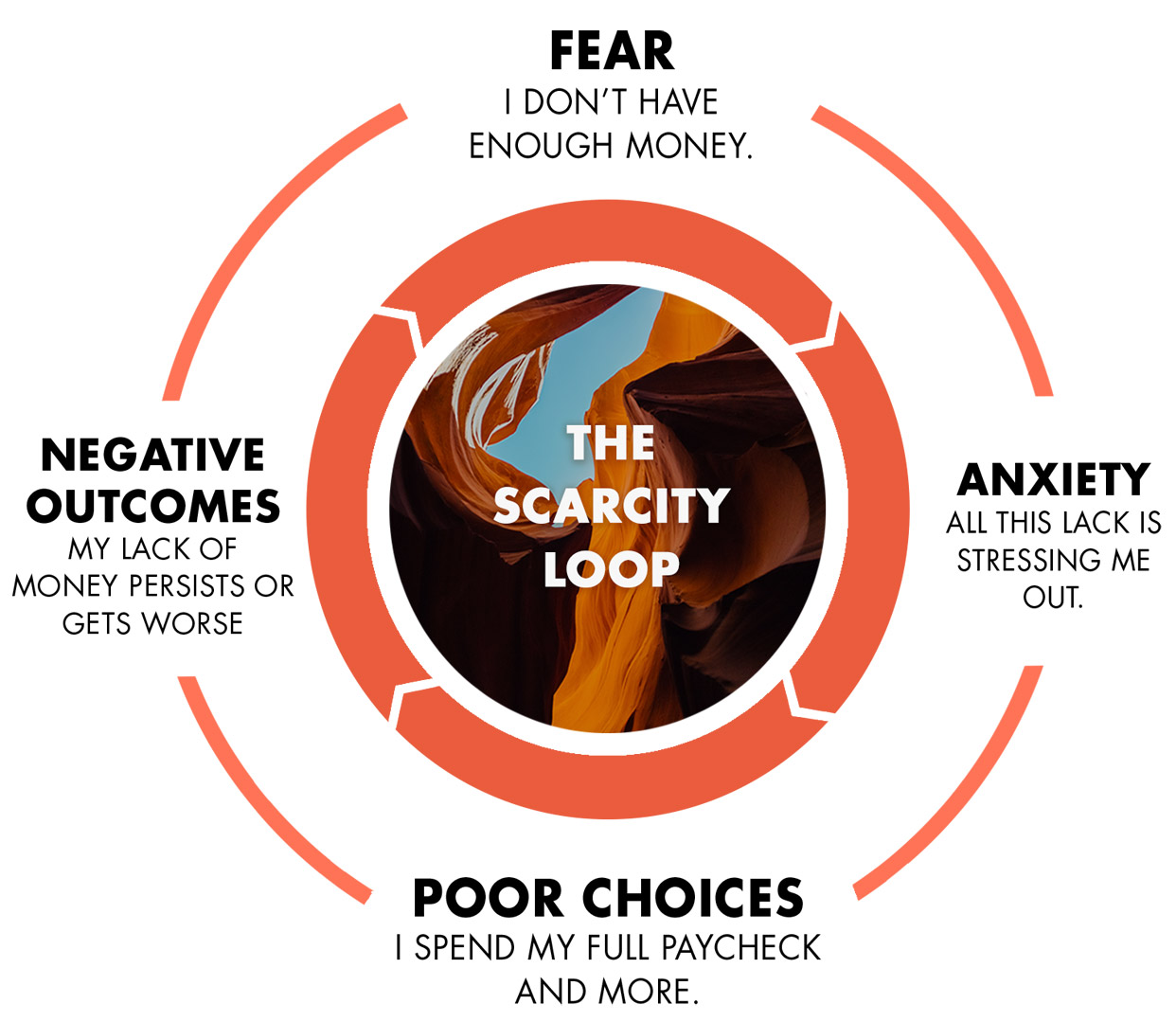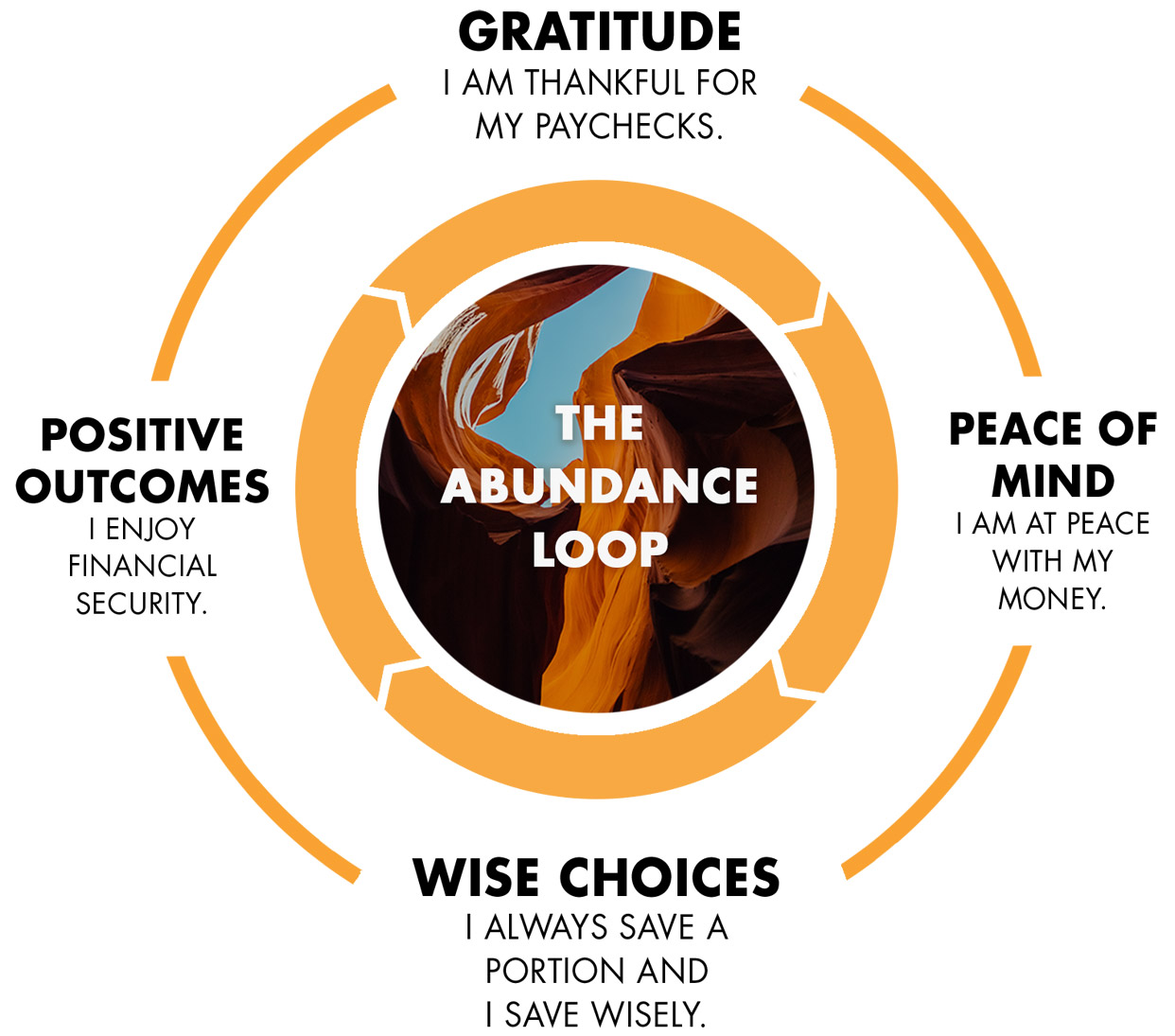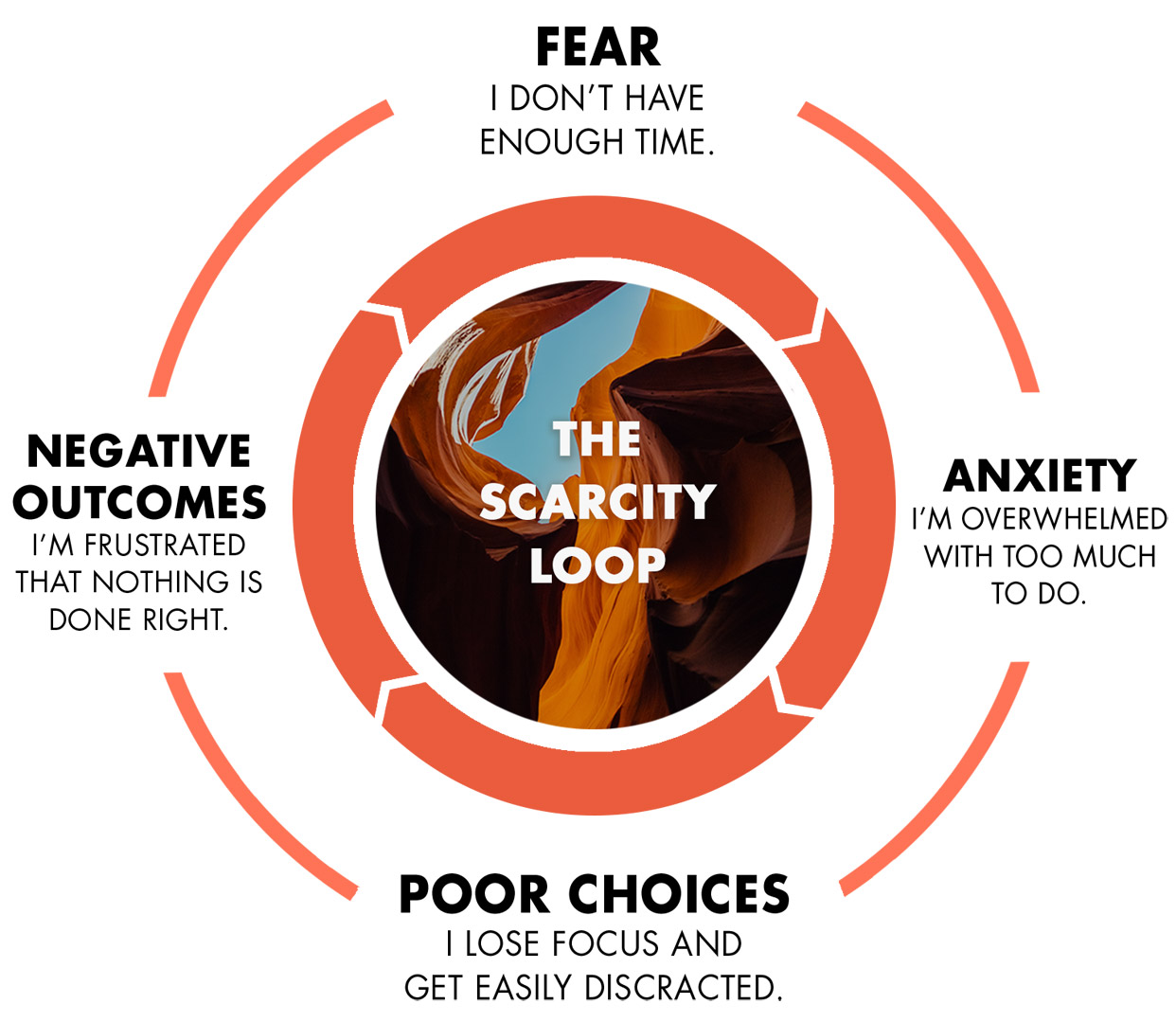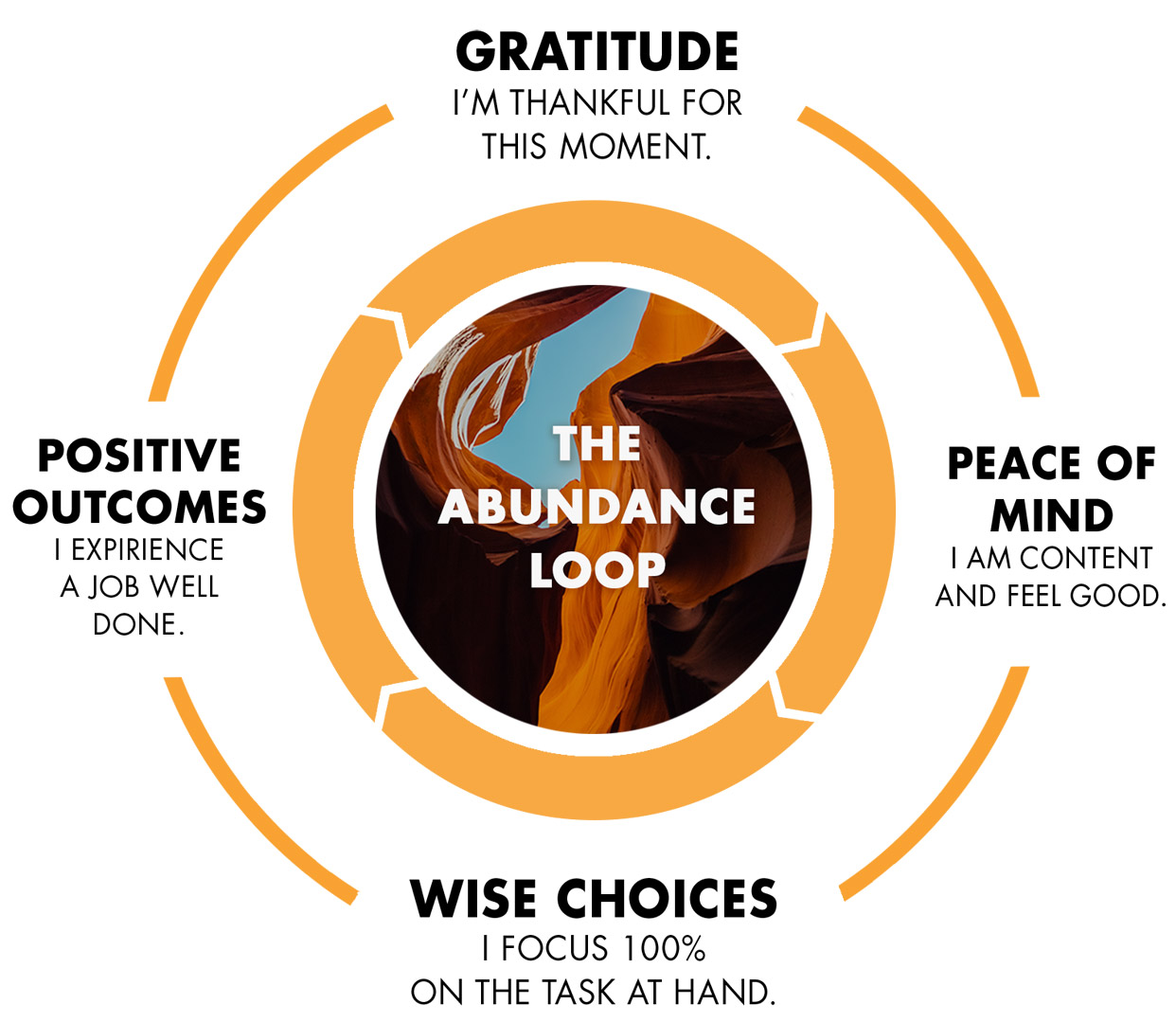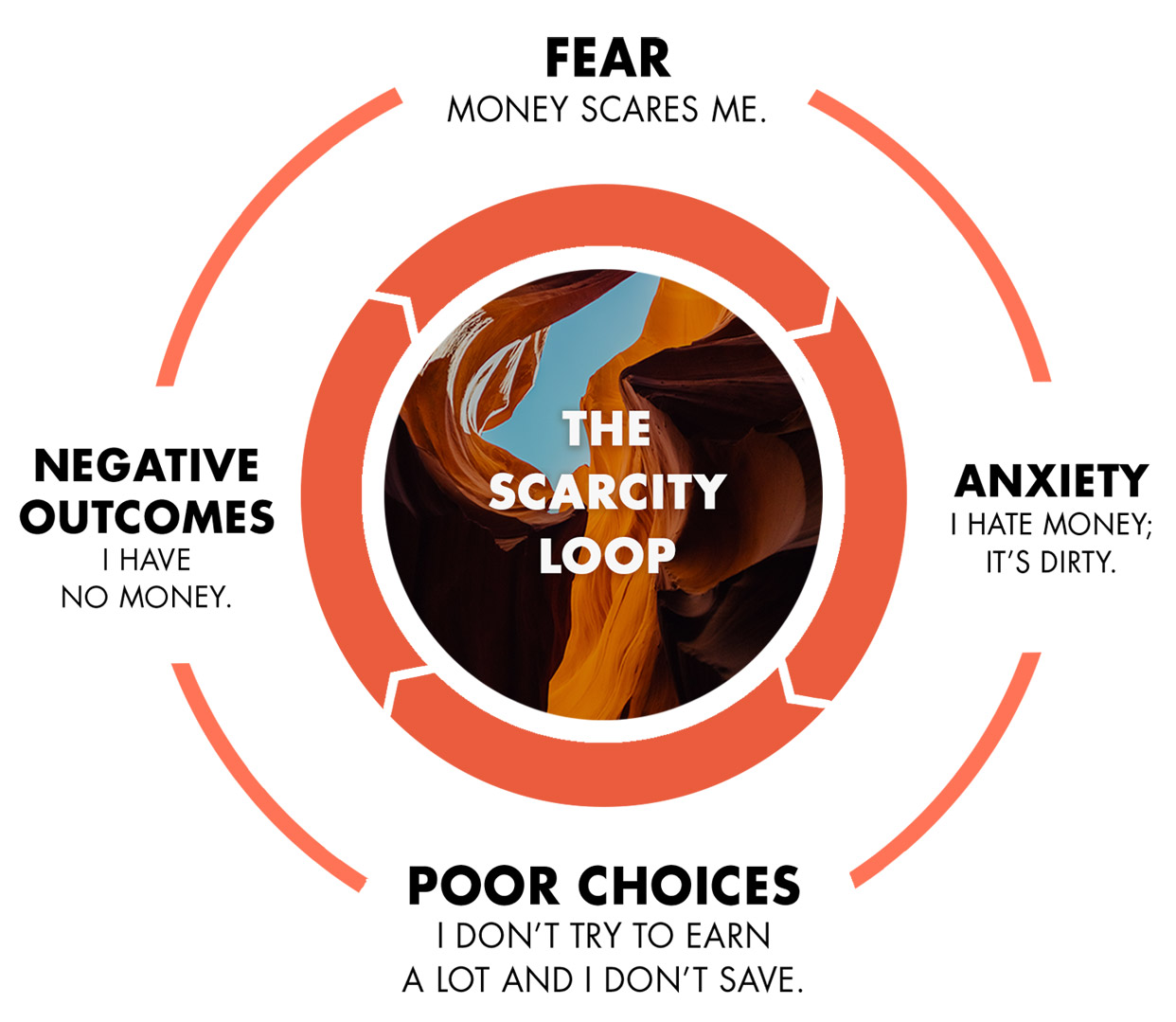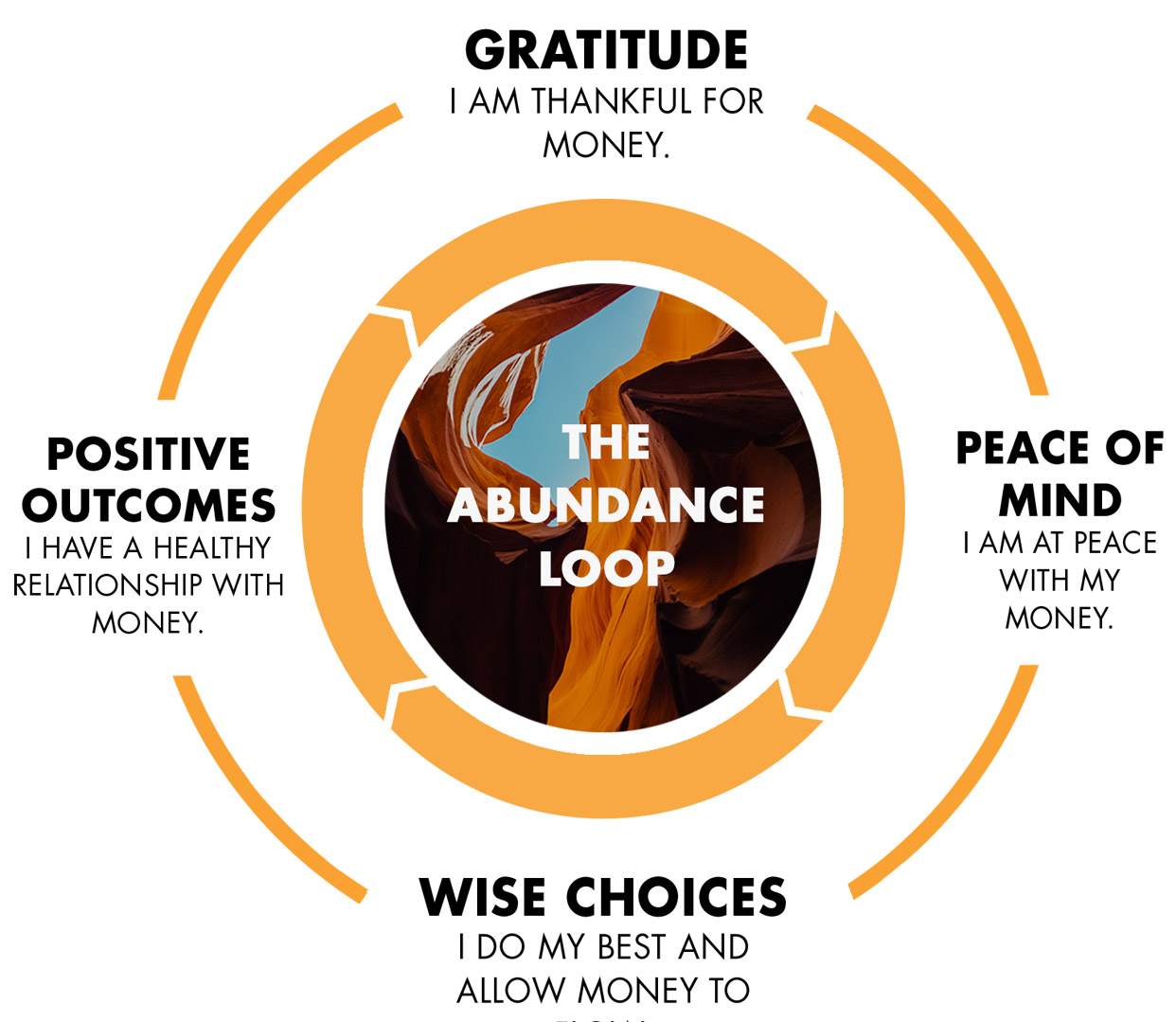The Abundance Loop:
How to Develop a Powerful Abundance Mentality That Attracts Wealth Effortlessly
BY JULIANA PARK, CFP
 our beliefs, mindset and emotions are the key to an abundance mentality and attracting wealth effortlessly.
our beliefs, mindset and emotions are the key to an abundance mentality and attracting wealth effortlessly.
Who Do You Believe You Are?
We all hold onto beliefs about who we are and what is possible. Have you ever asked yourself how true are these beliefs? I am astounded and saddened when I hear statements such as these:
“I’ll never be rich.”
“There’s never enough.”
“I’m not good enough.”
“I’ll never be happy.”
These self-limiting beliefs keep you stuck in the Scarcity Loop. When you believe that money is not within your grasp, you get discouraged and give up. Or worse, you may not even try. When the running script in your head is I don’t have enough to save for the future, you don’t put money away, and, therefore, you lack a nest egg. You create a self-fulfilling prophecy. If we believe something is not in the realm of possibility, we don’t bother wasting our energy trying; thus, it’s not in the realm of reality.
“If we believe something is not in the realm of possibility, we don’t bother wasting our energy trying.”
I hear many people say they can’t afford to quit their jobs. And you know something, they’re right. They tell themselves that they can’t quit and then spend their full paychecks (and then more on credit) so that they make it harder and harder to ever quit their jobs. People who are dependent on their employer’s paychecks are not free. Yes, I know, I recognize that most of you are probably not free… yet.
But what if I told you that you could be financially free? Would you believe that you could quit your job, spend your time doing what you love, and still receive an income to pay your bills? Probably not. But ask yourself truthfully: What do you have to lose by changing your belief and adopting an abundance mentality? What would happen if you started to believe that you could indeed save and that you could actually afford to send your children to college or even retire from a grueling job?
I dare you to adopt an abundance mentality and believe that you can be financially free and that you can be rich. I need you to believe it. Because if you can’t even believe it, then taking action toward realizing it may prove futile since it’s not always an easy road.
For this to work, you must have the faith and conviction to withstand the many temptations that come your way and not let challenges deter you from achieving your dream. Many people start with the best of intentions to change their habits, but they revert out of an abundance mentality to old ways once the going gets tough. They stay stuck because they haven’t moved past their old stories, which are the old scripts, of who they are and what is possible.
To help you over this very important hurdle, I am going to introduce you to some common self-limiting beliefs that get in the way of living our dreams. You’ll see how to let go of some of the fear-based beliefs that have defined your identity and shaped your life up to this point. And you’ll learn how to reframe them so you can develop an abundance mentality and start to take the right actions to reach a whole new financial future.
Self-Limiting Belief #1: I Don’t Have Enough Money
This is an offshoot of the fear of not having enough of anything. This fear can easily become the thought I have to have it now, which is endemic to the Scarcity Loop, making you feel incomplete without the object of temptation. Let me show you how this looks in the Scarcity Loop:
The obvious way to break this cycle is to stop shopping or spending money on things you don’t need. But for most people, restraining oneself from spending feels like punishment or deprivation and is counterproductive to developing an abundance mentality. Even if you cut up your credit card, you can’t change your habits until you are willing to change the beliefs you have about that situation in the first place.
“I dare you to believe that you can be financially free and that you can be rich.”
If you have a scarcity mind-set, then refraining from spending feels like torture, like being on a crash diet over Thanksgiving. My intention is not for you to build wealth at the expense of your happiness. Instead of pain, I want you to feel both financially and spiritually fulfilled. This is only possible when you shift your awareness away from what you lack and focus instead on what you have—this is an abundance mentality.
When the running script in your mind is I have enough, then you feel more at peace. Even when your ego is tugging at you to acquire more stuff, you feel convinced and empowered so that you recognize that you truly don’t need it. You have enough. The more you can hold off on spending today, the more money you will have available for the future. You can buy a cute pair of boots now or invest that paycheck and generate passive income to buy two pairs later. You will come to understand that the route to and abundance mentality and financial security is not meant to be laden with guilt and deprivation.
In fact, feelings of guilt and deprivation are symptomatic of the Scarcity Loop. When you feel you don’t have enough, you look externally to ease that sense of inadequacy. Although upgrading your living situation feels good at the moment, that happiness doesn’t last, so you will be tempted to take another dose of “inadequacy relief.”
Eventually, you will realize that the long-lasting solution doesn’t lie outside of you and it cannot be purchased, won, or earned. You actually have the treasure box inside of you right now, a healthy financial future, and all you need to unlock it is to shift into an abundance mentality and change your perspective from what you lack to what you have. The loop then begins not with lack but with gratitude.
Abundance Mentality Thinking for Belief #1: I Am Thankful for My Paychecks
This loop represents a balanced approach to achieving financial security, and it starts with embracing the wealth you already have. No matter how little you feel you have today, if you have the means to purchase and read this, you have more than you think.
To help you with this, I invite you to visualize an image with me. Take a moment to clear your mind and relax. Take a couple of slow, deep breaths. Now I want you to imagine that the company you work for has shut down and you are out of a job. Imagine that every dollar you have in the bank is now gone; and you lost your home, your car, and all your belongings. Then imagine that you lost your partner, your family, your friends, and your pets; and you also had to move from your community. And just for the sake of this exercise, let’s keep going and imagine that you have also lost your health, your limbs, your sight, your hearing, your speech, and your ability to read, write, smell, and taste.
How do you feel? How hard would you work to try to get back everything you had lost? Now, shake your head and clear your mind of these tragic thoughts of loss and despair. You haven’t lost all these things, maybe a few, but still you have an abundance of things to be thankful for, right at your fingertips. Can you believe the abundance you have right now?
Self-Limiting Belief #2: There’s Never Enough Time
When you think about balancing work, children, marriage, friends, church, personal health, and finances, how does that make you feel? If you’re like most people, you’re probably feeling a bit overwhelmed. When you believe you have to do it all and you have to do it all right now, you feel squeezed for time. This pressure to optimize your time puts you in task mode and you try to juggle it all, very often by trying to multitask. But studies have shown that only 3% of the population can actually multitask efficiently. The rest of us are better off focusing on one task at a time.
Here’s how this works in my own family: I know that when my children are with me, they make it clear that they want my full attention. I notice a huge difference in my own level of satisfaction when I put away my phone, don’t worry about my e-mails, and physically get on the floor with them and play. When I’m fully present with them, I can be more engaged and have fun, even if it’s just for a few minutes, which is an abundance mentality shift. But when I’m worried about how to respond to a client or what I’m going to write in my next chapter, then I rob that precious moment not only from my kids, but from myself, too. I end up feeling guilty for not being a good mom or being a good professional.
Here’s how we can reframe our view of scarcity of time:
Abundance Mentality Thinking for Self-Limiting Belief #2: I Am Thankful for This Moment
By shifting from fear of not having enough time to gratitude for the time you have, your mind becomes more relaxed and can focus on the task at hand. You do the job well and feel good about completing something to the best of your ability. If the task includes another person, then sharing quality time with that person instead of juggling e-mails and texts will result in a stronger relationship. Positive reinforcement supports you to continue operating in and abundance mentality, firmly in the Abundance Loop.
Self-Limiting Belief #3: Money Is the Root of All Evil
Money is the root of all evil. This is not exactly the wording from the famous phrase in the Bible, but it is the wording that many of us have internalized. The original phrase was more like, “For the love of money is the root of all evil,” depending on the translation you might refer to.
What is interesting about this phrase, however you say it, is highlighted in the following story. I had a wonderful conversation with a talented 78-year-old artist named Harold, who showed me that it’s never too late to change your perception about the rich. He was excited about my speaking on the topic of the abundance mentality, and he shared with me what happened when he adjusted his language around rich people relatively late in his life.
Throughout most of his life, Harold used to call people with money “filthy rich,” and he had little interest in connecting with “those greedy capitalists.” But he found that this thinking actually created such a separation from people based on how much money they had (or at least appeared to have) that it was damaging his overall energy and vibration around abundance in his own life.
“You have an abundance of things to be thankful for, right at your fingertips.”
For Harold, rich meant having enough resources to devote his time to making beautiful and elaborate collages in his small seaside studio. He felt rich at times, flirting with a true abundance mentality, but was never “filthy rich.” He eventually realized that his disdain for those with a lot of money (his stuck thinking about them) was creating a barrier against those who could afford to purchase his artwork.
When he became aware of this, he asked himself why he should judge someone simply because they have the means to afford a more expensive lifestyle. It was then Harold made a conscious effort to let go of his disdain for wealth and stopped calling those other people “filthy rich.” He still sees them as privileged, but he widened his perspective to recognize that he enjoys many privileges as well. He has lived and traveled through Europe, Asia, and Africa with his family of artists and together they worked on some amazing and high-profile public art projects. He eventually saw that he is indeed rich. As a result of reflecting about who is rich and what it means to him, Harold now interacts more peacefully with his patrons, taking better care of the money he earns, and feels better about himself, all hallmarks of an abundance mentality.
I share this story because there is value in taking stock in how you perceive money or those with money. As you can see with Harold, messages such as “money is evil” just serve to create a barrier between you, money and a true abundance mentality. You can see now how someone who holds this belief will repel money and let go of it as quickly as it comes into his or her hands.I keep coming back to ways to build your awareness about how this works, because only by truly understanding and questioning what you hold to be true can you break through blocks that keep you from flowing into an abundance mentality and the Abundance Loop. If this is an issue for you, try the following statement as your new thought pattern.
Abundance Mentality Thinking for Self-Limiting Belief #3: I Am Thankful for Money
I am thankful for money. See how this simple statement is a much more positive way to look at money in general? Here’s one more example that I hope will help drive the idea of an abundance mentality home. Perhaps you will see yourself or someone you know in Carol’s story.
How Beliefs about Money Impact Your Life
Carol was often stressed about money. She would panic that she didn’t earn enough and always seemed to be behind on her bills. She was tired of living that way and desperately sought to shift into an abundance mentality and heal her relationship with her finances. I suggested that she write down all her beliefs about money.
After I tell you about her experience, you will find this exercise explained for you to try. I gave Carol a piece of paper and had her write “money” in large letters across the top. I asked her to write down all the words that came up for her as she thought about money. Her list looked like this: scary, overwhelming, hate, questionable, scarce, hopeless, confusing, and help!
I then asked her about each word and how true it was. For example, she had written “scary” as one of her money beliefs. I asked her, “Is money itself scary?” She replied, “No, but not having money is scary.” In the following pairs, you’ll see her initial ‘money word’ on top and immediately below them her responses when I inquired deeper into each of her beliefs:
Carol’s Money Beliefs
How true is this belief?
What is your real money story?
Scary
Not having money is scary.
Overwhelming
Feeling like I don’t have enough is overwhelming.
Hate
I hate not being able to have money.
Questionable
My financial future is questionable.
Scarce
Money is scarce. It’s hard to come by. There’s never enough.
Hopeless
I never make enough, so it seems hopeless.
Confusing
I don’t know what to do with my money or my debt.
Help!
I need help!
Going through this exercise helped Carol realize that she didn’t really feel those words about money itself, but about the lack of money. She immediately thinks about the scarcity of money as opposed to the presence of money. Money itself doesn’t stress her, but not having enough does. Money itself isn’t confusing, but not knowing how to allocate her money is.
Separating the concept of “money” from her perspective of not having enough money really helped her clarify her abundance mentality and understand that money was not the main stressor in her life; it was her negative outlook, her scarcity mind-set, about money that was causing her to hate it and fight it. She had transferred the negative energy of her fear of not having enough money onto “money” itself.
“Only by truly understanding and questioning what you hold to be true can you break through blocks.”
To help her develop an abundance mentality, I had her identify what was really negative and make space for a healthier relationship to money. I proceeded to help her gain clarity around her financial situation. We laid out her assets, her liabilities, and her cash flow; and then we mapped out a plan to help her get out of debt.
After working with her to shift her awareness into an abundance mentality, challenge her beliefs, and lay out a concrete action plan, I then asked her to do the first exercise again and handed her another piece of paper. She wrote MONEY at the top, and this time, her words to describe money were hopeful, excited, less stressed, ready to get the plan started, positive, clear, concrete, understanding, and focused. She felt the powerful difference between her scarcity mind-set and an abundance mentality.
I followed up by asking her to write down and use these affirmations:
I have enough money.
I have enough money to take care of my needs at this moment.
I believe in my financial future.
I am financially secure.
I am abundant.
I am building financial wealth.
I am investing in myself.
In less than an hour, Carol felt empowered enough by her new abundance mentality to transform her relationship with money. She felt significantly better knowing that she had the power to change her beliefs around money and actually put together a plan. The act of writing out her financial situation, her savings (however minimal), debts (however looming and large), her income, and her expenses was cathartic. She felt happy to liberate her mind-set from the Scarcity Loop and excited about moving forward in the Abundance Loop.
Exercise: Developing An Abundance Mentality – Taking Inventory of Your Money Beliefs
1. Now it’s your turn. Take your journal out and write the word MONEY in big letters across the top. Write down the words that jump into your mind about money. Don’t censor yourself. Allow yourself to jot down whatever words, phrases, or images that come to your mind, without judgment. There are no right or wrong words, just your truth. Give yourself time and space to let your thoughts flow. Some of it might be scary or ugly—just let it flow.
2. Next, reflect on each word you wrote down. Ask yourself: Is this how I truly feel about money itself? Or is it about the lack of money? I want you to notice how each word makes you feel. If the word makes you feel tense and constricted, write “ugghh” next to it. If the word makes you feel open and expansive, write “ahhhh” next to it.
3. Now tally up how many “ugghhs” you have compared to “ahhhhs.” Don’t be hard on yourself if your list of words is all negative. Facing your deep-seated beliefs with honesty and compassion requires a sincere effort and is the key to developing an abundance mentality. Take pride that you are doing it. You are unveiling the underlying mind-set that impacts your financial wellbeing.
4. The good news is that now you are starting to identify your fears so you can master them. By reading this article and going through these exercises, you are taking a stand that you will no longer live in fear and confusion. You are ready to move forward and take action to align with your best self and your inherent abundance mentality. Celebrate this moment!
5. If most of your words give you a sense of relaxation and happiness, celebrate this wonderful blessing—you already have an abundance mentality about money. You can move forward with gratitude, and are ready to interact with money in a way that reflects your core values and manifest wealth.
More Resources For Removing Limiting Beliefs & Abundance Blocks: Free Masterclass Training on Creating Spiritually Aligned Wealth
Are you ready to go deep and erase all of your abundance blocks, limiting beliefs, emotional wounds and money stories so you can finally call in the level of prosperity your heart desires?
Our good friend and leading international spiritual teacher, T. Harv Eker, has put together a powerful, in-depth free training to help you master the art of creating spiritually aligned wealth here: The Spiritual Laws of Money – Free Masterclass Training
He’s one of the most sought after spiritual wealth teachers in the world and with good reason: what he teaches is massively effective and has a proven track record of getting results for students and participants worldwide.
If you are feeling blocked around money or simply want to create more of it in your life in a a spiritually aligned way, this is for you:
Sign Up Here: The Spiritual Laws of Money – Free Masterclass Training
This except on an abundance mentality is from The Abundance Loop by Juliana Park. It is published by Hay House (July 2015) and is available at bookstores or online at hayhouse.com.
About The Author
Juliana Park is an author, speaker, and conscious wealth champion. She has been advising wealthy families for almost 14 years and is currently Vice President at a global financial institution. A Certified Financial Planner, Juliana holds an MBA from the Yale School of Management and MA in Integral Psychology from John F. Kennedy University. She had served on the board of directors for the Financial Planning Association of San Francisco and for Northern California Planned Giving Council. Juliana lives an abundant life in Oakland, California with her husband and three children. Visit her website: julianapark.com





